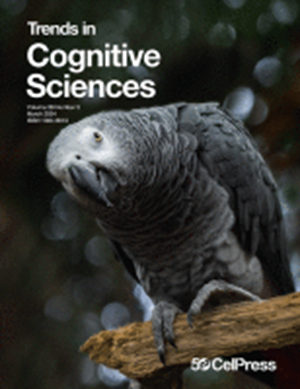焦虑会改变计划。
IF 16.7
1区 心理学
Q1 BEHAVIORAL SCIENCES
Trends in Cognitive Sciences
Pub Date : 2025-02-01
Epub Date: 2024-11-27
DOI:10.1016/j.tics.2024.11.001
引用次数: 0
摘要
临床医生已经提出了焦虑症是如何改变计划的,但却没有证明。在此,我将规划的计算模型综合并扩展到一个框架中,该框架可用于解释焦虑症中的规划偏差。为了促进其发展,我重点介绍了其中两个前景广阔的领域:任务构想和元控制。本文章由计算机程序翻译,如有差异,请以英文原文为准。
Anxiety involves altered planning.
Clinicians have suggested but not shown how anxiety involves altered planning. Here, I synthesize and extend computational models of planning in a framework that can be used to explain planning biases in anxiety. To spur its development, I spotlight two of its promising areas: task construal and meta-control.
求助全文
通过发布文献求助,成功后即可免费获取论文全文。
去求助
来源期刊

Trends in Cognitive Sciences
医学-行为科学
CiteScore
27.90
自引率
1.50%
发文量
156
审稿时长
6-12 weeks
期刊介绍:
Essential reading for those working directly in the cognitive sciences or in related specialist areas, Trends in Cognitive Sciences provides an instant overview of current thinking for scientists, students and teachers who want to keep up with the latest developments in the cognitive sciences. The journal brings together research in psychology, artificial intelligence, linguistics, philosophy, computer science and neuroscience. Trends in Cognitive Sciences provides a platform for the interaction of these disciplines and the evolution of cognitive science as an independent field of study.
 求助内容:
求助内容: 应助结果提醒方式:
应助结果提醒方式:


